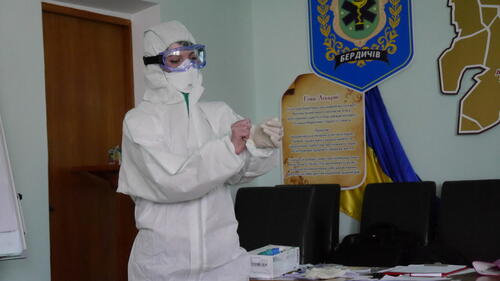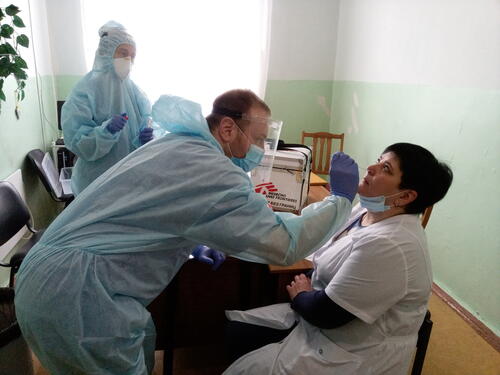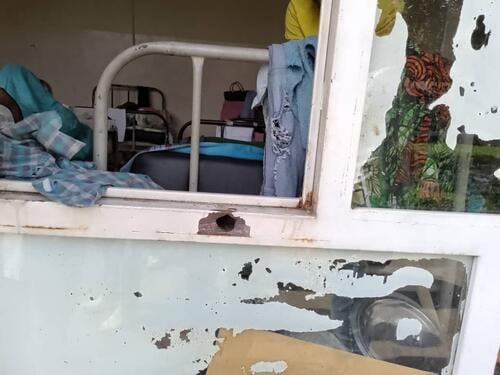The only European country facing an armed conflict, Ukraine’s healthcare system was already under great strain, especially in the east where sporadic hostilities have left many struggling to access healthcare. The spread of COVID-19 threatens to further overwhelm the country’s healthcare capacity.
Ukraine is also facing a crippling shortage of personnel, with around 25 per cent of its doctors now at retirement age.Last data provided by the Ministry of Health of Ukraine refers to 2017. The lack of medical and personal protective equipment only undermines Ukraine’s limited capacity to respond to the COVID-19 pandemic. It’s also quite concerning the fact that almost 20 per cent of Ukrainians with confirmed infections are healthcare workers; 19 of them died and around 2,000 remain ill or are convalescing.
Alongside this, high rates of chronic diseases make eastern Ukraine particularly vulnerable to coronavirus COVID-19.

Having provided medical care to conflict-affected communities for some years already, Médecins Sans Frontières (MSF) is now supporting Ukraine’s Ministry of Health to respond to COVID-19 in the Donetsk and Zhytomyr regions.
MSF teams are providing home-based care to vulnerable people living close to the conflict zone to reduce the burden on the few health structures that remain open in the region. We have two mobile teams in Mariinka, in the Donetsk region, to reinforce health services and shield elderly Ministry of Health staff from exposure to COVID-19. Our teams provide contact tracing, screening and home-based care for people with mild symptoms. They also refer patients that require hospitalisation and assist with collecting samples for COVID-19 testing in Ministry of Health-designated laboratories.
MSF is reinforcing the capacity of Ministry of Health staff. So far, almost 170 healthcare workers in Donetsk and Zhytomyr have received training on the proper use of protective equipment, infection prevention and control, how to manage the flow of patients through triage, screening and isolation, and safe waste management. Psychological care for medical staff, patients and community is also available through hotlines to address the cumulative stress of conflict and confinement.
“Some of the patients we have visited to provide home-based care hear the hostilities of the conflict every day, live in damaged houses... I remember a young family with four children in a house where the cracked door and windows do not close,” says MSF doctor, Olga Taushan.
Facilities have been slow to implement infection control measures, and there are still issues with the correct use of personal protective equipment.Marve Duka, MSF project medical referent
Keeping healthcare workers safe
“We have visited around a third of the facilities designated to treat COVID-19 patients in the Zhytomyr region,” says Marve Duka, MSF project medical referent. “Healthcare workers are quite motivated despite the challenges they face in treating patients.”
“Facilities have been slow to implement infection control measures, and there are still issues with the correct use of personal protective equipment,” says Duka. “If they don’t know how to put on and take off their protective equipment or properly set-up screening, triage and isolation areas, for example, staff can get infected, infect each other and infect patients in other areas of the hospital.”
Continuity of care in a setting with high rates of infection and chronic diseases
Ukraine is among the countries with the highest rate of multi-drug-resistant tuberculosis in the world and also has high rates of hepatitis C, HIV, alcohol use disorder, obesity, cardiovascular disorders and diabetes. All of which are factors that seem to increase the risk of people that contract COVID-19 developing severe symptoms. All MSF patients in Ukraine fall into one of these groups.
As such, it is a priority for MSF to ensure that we can continue to care for our patients. We are ensuring supplies of medications for the length of the announced quarantine period, sharing information on how to prevent COVID-19 and offering our patients psychosocial support, mainly by phone. We are treating almost 170 patients multi-drug-resistant tuberculosis and continue to enrol on average four patients a week on treatment programme, just as before the pandemic. In Sievierodonetsk, we continue to donate medicines to the local HIV programme to treat a range of infections.






